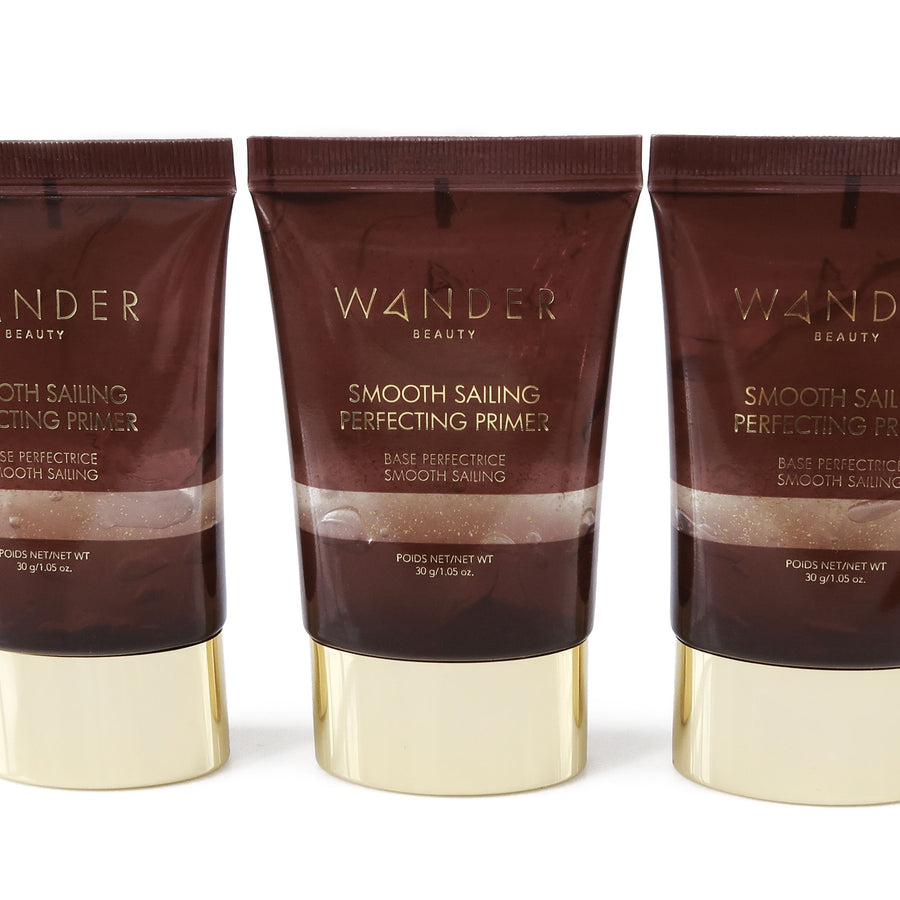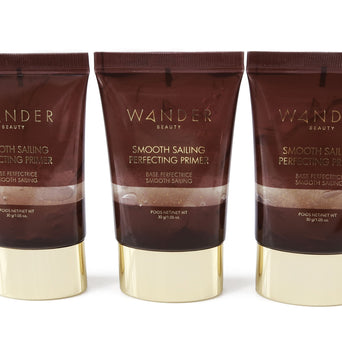Is Silicone Primer Really Bad For Your Skin? Here's What You Need To Know
By Wander Beauty | Feb 06, 2019
Silicone has built quite a reputation in the beauty industry. Some people hear silicone and immediately shy away, while it’s a must-have for others. Playing both a villain and a hero in many beauty routines, it can be confusing to determine whether or not silicone is good or bad for your skin. You may have heard that silicone is an ingredient you should avoid if you are prone to acne, but on the other hand, silicone in beauty products also provides you with a smooth complexion. So is silicone actually bad for your skin? We’re breaking down the rumors on this controversial ingredient.
What is Silicone?
Silicone is made from a combination of silicon, oxygen, and other elements such as carbon and hydrogen. It undergoes extensive chemical processing, meaning that it’s a synthetic ingredient, and is then added to many beauty products. The thought of synthetic material in your beauty products may leave you with a bad taste in your mouth, and many people generally have the impression that silicone is bad just because it is synthetic. However, that is not necessarily the case!
A quick and easy way to spot whether or not beauty products contain silicone is to check the label for ingredients ending in -cone or -siloxane.
Some examples include:
Cone: amodimethicone, dimethicone, methicone, trimethicone
Siloxane: cyclopentasiloxane, polydimethylsiloxane, siloxane
How is Silicone Used in Beauty Products?
Silicones are found in many beauty categories. From skincare to haircare, silicones can be found in just about every type of product, including but not limited to:
Skincare: Moisturizers, serums, face oils, sunscreens, face mists, face masks
Makeup: Foundations, primers, concealers, powders, blushes
Haircare: Hair masks, hair oils, shampoos, conditioners
Silicones are used in many beauty products because they add the extra ‘oomph’ to make everything look and feel even better. Due to their unique properties, silicones are great for improving the feel, appearance, and performance of products. They give serums and moisturizers the luxurious texture that applies seamlessly on the skin. Silicone also creates a film on your skin that helps to retain moisture, keeping skin hydrated. It doesn’t stop there! It also mattifies surface shine on skin and fills in fine lines and wrinkles, and smoothes texture, providing a blurring effect.
What Are Some Misconceptions About Silicone?
You may already be wary of silicones, but do you know why? Here are some of the common assumptions about silicone, debunked.
Silicones Cause Irritation: False
Silicones are noncomedogenic, nonacnegenic, nonirritating and hypoallergenic. They lower or eliminate irritation because they actually cause ingredients to spread evenly during application, which minimizes percentages of potentially irritating forms of cosmetic and drug ingredients such as alpha hydroxy acids (AHAs), salicylic acid, and benzoyl peroxide.
Silicones Prevent Other Skincare Ingredients From Penetrating Skin: False
Yes, silicones create a barrier on the skin that helps to retain moisture to keep skin hydrated. But this barrier doesn’t suffocate skin. Silicones have a particular molecule structure, which is made of larger molecules with wider spaces between each molecule. That means they can trap water in without interfering with your skin’s natural functions, like perspiration. The barrier silicones creates has gaps, so your favorite ingredients, including vitamin C and retinol, will still be able to get through.
Silicones Make Skin Greasy: False
Most silicones are invisible when they’re applied on the skin. They actually absorb sebum and mattify the skin, which visibly minimizes your pores in the process.
Should You Use a Silicone Primer?
Face primers prep your skin for product application (like foundation) and help your makeup stay flawless all day long. Many of today’s primers contain skin-loving ingredients, oils, and vitamins that provide your skin with additional nourishment as you wear. There are many different types of primers, both with silicone and without, out in the market - so how do you decide if you should be reaching for a silicone primer?
Silicone primers will help your makeup last longer, diminish the appearance of pores, and balance redness, while providing hydration. They provide a quick fix for wrinkles and fine lines, and still allow your skin to absorb all the nutrients you apply to it. If you have uneven texture, a silicone primer will help to even it out, leaving behind a smooth canvas for makeup application.
Our favorite silicone primer that provides seamless makeup application? Meet Wander Beauty’s new Smooth Sailing Perfecting Primer. Its silky, lightweight formula blends beautifully into your skin, leaving behind an even canvas that provides a silky smooth application that anchors makeup for extended wear. Even if you’re not planning to wear makeup, you can wear Smooth Sailing alone to blur imperfections on no makeup days.
Not an everyday primer user? Reach for Smooth Sailing Perfecting Primer for special occasions to lock your look. Top off with a translucent powder, like Play All Day Translucent Powder, for even longer wear.<product>1</product>
Smooth Sailing Perfecting Primer is enriched with vitamins E and C, which are known to protect skin from environmental stressors and strengthen skin's natural moisture barrier. The suspended gold flakes don’t just make this formula pretty to look at, but they help increase elasticity for healthier looking skin.
Ready to set sail with a perfected base? Shop Smooth Sailing Perfecting Primer here.
Is Silicone Primer Really Bad For Your Skin? Here's What You Need To Know

Silicone has built quite a reputation in the beauty industry. Some people hear silicone and immediately shy away, while it’s a must-have for others. Playing both a villain and a hero in many beauty routines, it can be confusing to determine whether or not silicone is good or bad for your skin. You may have heard that silicone is an ingredient you should avoid if you are prone to acne, but on the other hand, silicone in beauty products also provides you with a smooth complexion. So is silicone actually bad for your skin? We’re breaking down the rumors on this controversial ingredient.
What is Silicone?
Silicone is made from a combination of silicon, oxygen, and other elements such as carbon and hydrogen. It undergoes extensive chemical processing, meaning that it’s a synthetic ingredient, and is then added to many beauty products. The thought of synthetic material in your beauty products may leave you with a bad taste in your mouth, and many people generally have the impression that silicone is bad just because it is synthetic. However, that is not necessarily the case!
A quick and easy way to spot whether or not beauty products contain silicone is to check the label for ingredients ending in -cone or -siloxane.
Some examples include:
Cone: amodimethicone, dimethicone, methicone, trimethicone
Siloxane: cyclopentasiloxane, polydimethylsiloxane, siloxane
How is Silicone Used in Beauty Products?
Silicones are found in many beauty categories. From skincare to haircare, silicones can be found in just about every type of product, including but not limited to:
Skincare: Moisturizers, serums, face oils, sunscreens, face mists, face masks
Makeup: Foundations, primers, concealers, powders, blushes
Haircare: Hair masks, hair oils, shampoos, conditioners
Silicones are used in many beauty products because they add the extra ‘oomph’ to make everything look and feel even better. Due to their unique properties, silicones are great for improving the feel, appearance, and performance of products. They give serums and moisturizers the luxurious texture that applies seamlessly on the skin. Silicone also creates a film on your skin that helps to retain moisture, keeping skin hydrated. It doesn’t stop there! It also mattifies surface shine on skin and fills in fine lines and wrinkles, and smoothes texture, providing a blurring effect.
What Are Some Misconceptions About Silicone?
You may already be wary of silicones, but do you know why? Here are some of the common assumptions about silicone, debunked.
Silicones Cause Irritation: False
Silicones are noncomedogenic, nonacnegenic, nonirritating and hypoallergenic. They lower or eliminate irritation because they actually cause ingredients to spread evenly during application, which minimizes percentages of potentially irritating forms of cosmetic and drug ingredients such as alpha hydroxy acids (AHAs), salicylic acid, and benzoyl peroxide.
Silicones Prevent Other Skincare Ingredients From Penetrating Skin: False
Yes, silicones create a barrier on the skin that helps to retain moisture to keep skin hydrated. But this barrier doesn’t suffocate skin. Silicones have a particular molecule structure, which is made of larger molecules with wider spaces between each molecule. That means they can trap water in without interfering with your skin’s natural functions, like perspiration. The barrier silicones creates has gaps, so your favorite ingredients, including vitamin C and retinol, will still be able to get through.
Silicones Make Skin Greasy: False
Most silicones are invisible when they’re applied on the skin. They actually absorb sebum and mattify the skin, which visibly minimizes your pores in the process.
Should You Use a Silicone Primer?
Face primers prep your skin for product application (like foundation) and help your makeup stay flawless all day long. Many of today’s primers contain skin-loving ingredients, oils, and vitamins that provide your skin with additional nourishment as you wear. There are many different types of primers, both with silicone and without, out in the market - so how do you decide if you should be reaching for a silicone primer?
Silicone primers will help your makeup last longer, diminish the appearance of pores, and balance redness, while providing hydration. They provide a quick fix for wrinkles and fine lines, and still allow your skin to absorb all the nutrients you apply to it. If you have uneven texture, a silicone primer will help to even it out, leaving behind a smooth canvas for makeup application.
Our favorite silicone primer that provides seamless makeup application? Meet Wander Beauty’s new Smooth Sailing Perfecting Primer. Its silky, lightweight formula blends beautifully into your skin, leaving behind an even canvas that provides a silky smooth application that anchors makeup for extended wear. Even if you’re not planning to wear makeup, you can wear Smooth Sailing alone to blur imperfections on no makeup days.
Not an everyday primer user? Reach for Smooth Sailing Perfecting Primer for special occasions to lock your look. Top off with a translucent powder, like Play All Day Translucent Powder, for even longer wear.<product>1</product>
Smooth Sailing Perfecting Primer is enriched with vitamins E and C, which are known to protect skin from environmental stressors and strengthen skin's natural moisture barrier. The suspended gold flakes don’t just make this formula pretty to look at, but they help increase elasticity for healthier looking skin.
Ready to set sail with a perfected base? Shop Smooth Sailing Perfecting Primer here.


